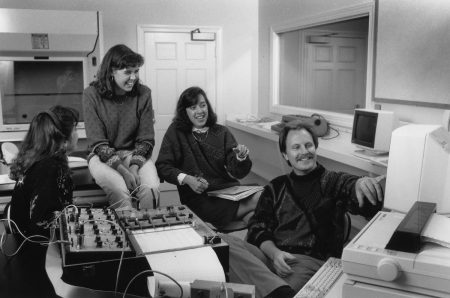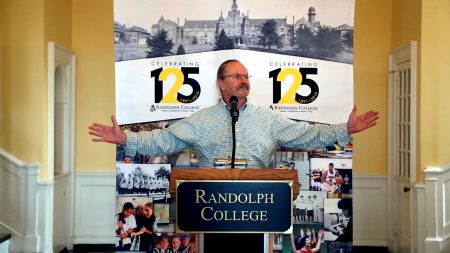Retiring psychology professor Dennis Goff reflects on his time behind the Red Brick Wall

Psychology professor Dennis Goff
This story is part of a series featuring faculty members who are retiring in 2020.
There’s always a bit of luck involved in finding the perfect fit, says psychology professor Dennis Goff.
That’s how he wound up at the College in 1986. His wife, a physician, had begun practicing in Moneta, and they wanted to stay in the area. So he applied for a position here. After he’d accepted, Goff told the chair of his department at Virginia Tech, who reassured him that the College was the best in the area.
“‘You will like it there,’” Goff recalled his chair telling him. “He was right.”
Goff, who earned his undergraduate degree from Lynchburg College and his master’s and Ph.D. from Virginia Tech, is retiring this year. Here is what he had to say about his time behind the Red Brick Wall:
Where did your interest in psychology first come from?
“I more or less stumbled into psychology. I took an introductory course in my first year of college at the University of Louisville. It was one of those giant lecture courses and honestly, classes were not interesting. I did enjoy the textbook though. I took a year off from college and became interested in teaching and applied psychology during that year. When I went back to college at Lynchburg College, I tried English, and thought about philosophy and theater before I settled into psychology.
“My love for the discipline was triggered by the research opportunities that I had in those undergraduate years. My teachers were interested in a relatively pure behaviorism, while I was intrigued by some rediscovered older ideas. Fortunately those professors indulged and nurtured my idiosyncratic interests. Of equal importance, I knew from those experiences that I wanted to teach in a liberal arts setting.”

Psychology professor Dennis Goff works with students in this archive photo.
Why a liberal arts setting?
“The big university seemed to lack the personal connection that is more common in a liberal arts college. Perhaps even more importantly, the liberal arts curriculum engages students in a broader curriculum. A student who majors in psychology can also nurture a deep interest in history, philosophy, or any other discipline. I recognized the liberal arts curriculum as less specialized. At the same time, the personal connection I had with faculty invited me into the laboratory.”
When and how did you decide to go into higher education?
“Early on, I thought about teaching high school. I had some remarkable role models during my years at Lynchburg College. They seemed to really enjoy what they were doing. And I could see them making a difference, not just in my life but in the lives of my peers. I started to see myself following their lead. I was also drawn to the laboratory! Being a professor was the best route to being able to both teach and do research. The experiences that I found in the lab were probably the driving force at that time. But I also had some experiences that suggested I could be an effective teacher. Though at that time I did not realize how much work it takes to be a good teacher.”
You’re not just interested in psychology but its connection with biology. Could you talk a little bit more about your research in these areas?
“In my high school biology course, I was most interested in the chapters on the brain and animal behavior. I naively wanted to figure out how those two worked together. Mixed into that was an emerging zeitgeist on the relationship between body and mind. Those interests were seen in how the mind might influence health. But even more startling was the observation, at that time, of how meditation and psychedelic drugs could alter consciousness. The latter is born out in more contemporary work reviewed by Michael Pollan in How to Change Your Mind.
“For my dissertation I studied the pattern of sleep of newborns as an indication of their well-being. I was not able to continue that work here in Lynchburg. For most of my years here, I have tried to interest students in these kinds of questions and succeeded at times. As a result of collaborations over summer research and in our senior seminar, we have examined the role of digit-ratio as a predictor of sex-typed behaviors. That ratio is thought to be an indicator of prenatal exposure to testosterone. Students have also generated interest in the evolutionary basis of judging attractiveness in others.”

Dennis Goff, Charles A. Dana Professor of Psychology, wishes the College a happy birthday in 2016.
What is your teaching philosophy, and how have you approached that here at Randolph?
“My philosophy is fairly simple. I expect that every student is an individual and that every student is interested in learning about their world. My job then is to present opportunities for that learning. That means I spend a lot of time in my classroom and office listening to students, watching their faces, searching for evidence of that interest. When I see it, I try to feed it so it might grow. You will have to ask my students how successful I have been at that.”
What have been your favorite classes to teach?
“I was totally surprised at how much I have enjoyed teaching Applied Statistical Analysis! When my colleagues asked me to teach the course 18 years ago, I had more than a little trepidation. Most students are apprehensive when they begin the course and don’t really believe in the utility of statistical analysis. I approached the course as a challenge to break down those barriers to learning. My favorite comments on those course evaluations read something like, ‘He is way too excited about statistics.’
“I have always enjoyed teaching upper level courses where students sit down together and talk about the research and ideas that we are reading about together. My most recent course in that format was Evolutionary Psychology. But the truth is that I have enjoyed almost every course I have taught.”
What advice would you give to students?
“This is a hard question, made especially difficult in the age of COVID-19. My advice boils down to read! Read almost anything: short stories, poetry, novels, newspapers, news magazines. And stay informed about what is happening in the world.”
What’s next for you?
“I don’t have particular plans yet. Being on this giant pause caused by the pandemic makes it a little difficult for me to think about big plans. I will treat this summer much as I have others. That means a chance to visit with my children and grandchildren, gardening, taking care of chores around the farm and house, and reading a lot. I will think seriously about how to structure all of the time I have now. A friend who retired recently said, ‘I really enjoy waking up each day and reinventing myself.’ I look forward to that kind of freedom.”

